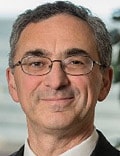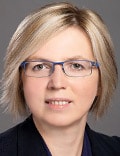As the second anniversary of Russia's invasion of Ukraine approaches later this month, a recent report found rates of hospital-acquired infections and antimicrobial-resistant organisms in Ukrainian hospitals were "substantially higher" after the assault than they were 5 years before the war.
Experts said even before Russia attacked in February 2022, infection control in Ukrainian hospitals was such a novelty that handwashing sinks were nearly nonexistent. Now healthcare workers in the country must try to control superbugs while dodging missiles, but they are getting help at a critical hour from Western institutions like Harvard Medical School.
"We have a huge problem," said Denys Surkov, MD, chief of infection control at First Lviv Medical Union, the nation's largest hospital. "We are in the ages of Lister."
Surkov, 53, who is also medical director for Ukraine's largest military training center, is one of 30 clinicians who have received mentoring and state-of-the-science training at Harvard through the university's Scholars at Risk Program. Partnering with the Heal Ukraine Group (HUG) and the Global Medical Knowledge Alliance, Scholars at Risk has invited the country's top mid-career specialists to transfer what they learn to improve healthcare delivery in Ukraine.
Mark C. Poznansky
Lots of small boats make a huge difference.
"They're rebuilding better — and they're doing this during a war," said Mark C. Poznansky, MD, PHD, director of the Vaccine and Immunotherapy Center at Massachusetts General Hospital, in Boston, Massachusetts, and a co-founder of HUG. Poznansky described the program as "part of a whole mosaic of small groups helping in as many ways as possible." He compared the work to the evacuation of Dunkirk during World War II, when privately owned — and more nimble — marine craft rescued Allied soldiers pinned on the beaches by the Nazi military. "Lots of small boats make a huge difference," he said.

The program has invited specialists from a variety of fields, including cardiovascular and transplantation medicine, OB/GYN, trauma care, immunotherapy, and mental health. Roughly six specialists are trained at a time for several weeks before returning home, and the program is small enough to adjust to emerging needs. Since the war began, childbirth rates have plummeted, while rates of posttraumatic stress disorder have skyrocketed, especially among teenagers.
"We want to show them what's possible," said Jacqueline Hart, MD, a member of the HUG team and an expert on lifestyle and behavioral medicine. No one is looking through rose-colored glasses, though, she added. "They're not going back as experts in any particular procedure, so we have to temper what we're exposing them to and understand their learning and training will continue."
Improving the 'Software'
"It's not just a one-and-done," said Nelya Melnitchouk, MD, MSc, a Ukrainian-American colorectal surgeon at Brigham and Women's Hospital and co-founder of the Global Medical Knowledge Alliance. "We also want them to disseminate the knowledge."

Such knowledge was lagging in the Ukrainian healthcare system, which Melnitchouk said "has a lot of remnants from the old Soviet Union system." Students there often enter medical school straight from high school. Fellowships are closer to 3 months than 3 years. "It's unstructured," she explained. "If you are attached to a good surgeon, you will learn. But you will only learn what that surgeon knows."
"Regular diseases don't go away" during wartime, Melnitchouk said. "You have to treat them, even with less resources." And while Western aid includes supplies, education is important. "If you have a tourniquet and don't know how to use it, what good is that?"
Physicians already are seeing improvement in Ukrainian hospitals, said Serguei Melnitchouk, MD, MPH, a Ukrainian-born cardiothoracic surgeon at Mass General who co-founded the Global Medical Knowledge Alliance with Nelya Melnitchouk, his wife. With the urging of clinicians who have immersed themselves in Western systems, the Ukrainian health ministry has stressed better infection control, treatment of patients with missing limbs, and a new focus on mental health issues that remain a stigma in the old Eastern bloc countries. "If they learn how to take care of these complex patients, care for all patients gets better," he said. "We improve the software. The hardware is not our primary goal."
Surkov said his goal is not only to find better antibiotics but also to identify and promote infection control practices more suited to a nation at war.
"Most CDC [Centers for Disease Control and Prevention] recommendations are based on microbiological resistance in the USA, not Ukraine," he said. His hospital sees "the most severely wounded warriors" who enter the hospital already with resistant infections. That problem was outlined in the recent CDC report, which was co-authored by a HUG alumnus.
Poznansky and others said they worry about fatigue after 2 years of what they call "The Big War" in Ukraine, which Russia invaded on February 24, 2022. "In the news cycle that we live in, it seems Ukraine has gone away," he said, especially since a new war has broken out in the Mideast. "The visibility of the story has waxed and waned." That, however, "has not limited our activity," and the group has raised about $750,000, he said.
The fundraising comes with the help of Ukrainians with no medical background. Pavlo Gintov, a Ukrainian-born pianist, has delivered a series of concerts to raise money for the cause. He plays pieces from Ukrainian composers even he'd never heard of because the Soviets had suppressed them. He calls his piano "an instrument of freedom."
Surkov saw the hospital infection rates as a microcosm of the overall political picture if the Ukrainian war fades from the news and donor radar and Russia wins. If Russia is unchecked, "it will attack Baltic countries. It will attack Poland and some other countries of NATO."
Serguei Melnitchouk said it's hard for Ukrainian healthcare workers even away from the front lines. During a recent visit, he said, "I spent two nights in a bomb shelter. The next day you come out and give a lecture. Life goes on, and patients are still sick. They still need medical treatment. It's remarkable that they are even willing to continue with these services, but what else are they going to do?"
John Dillon is a journalist in Boston.

